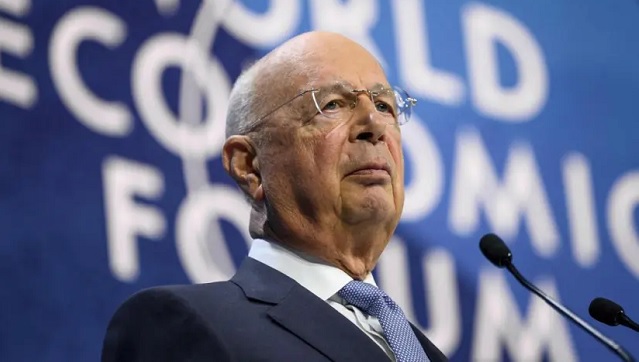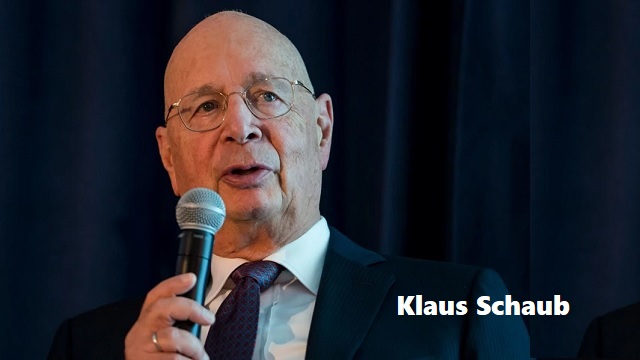WEF’er Klaus Schwab Pronounces ‘New Dawn” of Human Civilization Based on Technology and Transhumanism

Speaking Monday at the World Governments Summit in Dubai, the founder and executive director of the World Economic Forum, Klaus Schwab, said humankind is “transitioning” into “The Intelligent Age” powered by technologies springing forth from a Fourth Industrial Revolution.
This was the same summit addressed earlier in the day by Tucker Carlson, who calling out the transhumanists who “think they are God” and are using technology in a vain effort to “improve the human condition.”
On the same day, one of the world’s most prominent transhumanists, Klaus Schwab, commanded center stage and gave a very different view of the world from that envisioned by Carlson.
Schwab described a chilling vision of the near future in which he said human beings must prepare to have their physical, biological and digital identities integrated into one “fusion.”
Klaus Schwab, World Governments Summit:
"We have to be prepared for a world where we see a fusion of our physical, our digital & our biological dimensions.. So it will be a NEW WORLD" pic.twitter.com/ATg7aLER0K— Tim Hinchliffe (@TimHinchliffe) February 12, 2024
Schwab said this revolution in technology will power a global transition of humankind into a new era that he called The Intelligent Age, in which “humankind will enjoy many more opportunities and possibilities” to become god-like.
This includes features like linking your brain to the internet and wearing virtual-reality goggles on your face that will ultimately rewire your brain and be unable to tell the difference between reality and fantasy (not to mention make you look like an idiot).
Schwab says a new type of human will exist in this new era. It’s a “transition of humankind,” he said, a choice of words that was not coincidental. He used the word “transition” five times in a span of less than a minute.
Klaus Schwab, World Government(s) Summit 2024:
"We are speaking about the transition of humankind into a new era […] Today we speak about transitioning into what I would call 'The Intelligent Age.'" pic.twitter.com/Tnlsv6WNa6— Tim Hinchliffe (@TimHinchliffe) February 12, 2024
What he’s talking about here is the use of machine learning and AI to create a population of hybrid beings. These hybrids who exploit the “opportunities and possibilities” offered by technology to evolve into a whole new species. They will “transition” from humans into transhumans, bearing some of the hallmarks of the previous species but incorporating new characteristics powered by artificial intelligence.
Those who refuse to take advantage of these new “opportunities” will be left behind, unable to qualify for the best jobs and educational opportunities. You can already see that coming. AI will replace 60 percent of the jobs over the next 10 to 20 years, and those who refuse to become transhuman will be the first ones eliminated from the work force.
Eventually, you will also see purges from the upper ranks of the social strata, the so-called elites.
We already are experiencing an increasingly bifurcated society, with a wider distance between the haves and the have nots. The takeover by AI will exacerbate this process. The generation now on the Earth may be the last one to grow up remembering what it was like to actually be human. Young children currently under the age of 8 or 9 will not remember the human experience unless they are raised by parents who guard them from this pernicious drive to automate humanity and make people into soulless cyborgs — having access to more information than ever but unable to separate truth from fiction, love from hate, feelings from facts.
Schwab demonstrated how this works as he has already gone down this path, submitting to what he considers a higher power. He sacrifices his own free will to the will of his god, which is AI.
Schwab said he arrived at this conclusions about the Fourth Industrial Revolution not by researching and studying and then using his own ability to reason. No, he consulted ChatGPT.
“I had about 20 pages of text, and I asked ChatGPT, ‘Summarize the text, and tell me now, based on our discussion, how will the new era – the intelligent era – will look like,” he said.
Klaus Schwab reads ChatGPT, World Government Summit:
"Envisioning a future propelled by the technologies of the 4IR we see a NEW DAWN of human civilization.. where AI, robotics, the IoT, 3D-printing, genetic engineering, quantum computing become the foundations of our daily life" pic.twitter.com/YL86IDCtxD— Tim Hinchliffe (@TimHinchliffe) February 12, 2024
So, instead of going to God the Father and consulting Him about our “deepest needs and aspirations” as human beings, we should go to AI for such answers. And by doing this, Schwab promises the creation of a “new dawn of human civilization” without God. Isn’t this the Tower of Babel all over again?
Copyright 2024. Leo Hohmann. All rights reserved.
LeoHohmann.com is 100 percent reader supported, offering independent analysis critical to living a life of freedom in the 21st century. If you appreciate my work and would like to support it, please share these articles. You may also send a donation of any size c/o Leo Hohmann, P.O. Box 291, Newnan, GA 30264. Or, you can donate via credit card at the Christian crowdfunding site GiveSendGo.


